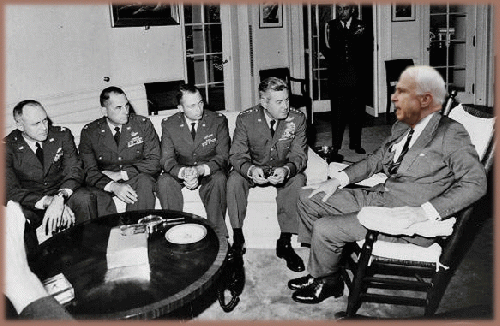Here's a question Americans ought to ask themselves as they assess the presidential nominees and decide how to vote on November 4th: Where would we be today if the president during this week in 1962 had been JSM, instead of JFK? Or maybe the question should be: Would we be today if John McCain had been president during the Cuban Missile Crisis?
Opinion surveys indicate that Americans believe that Sen. McCain would be a more effective commander in chief than his Democratic opponent, Sen. Barack Obama. As Obama has pulled away to a lrage overall lead and even bigger leads in many areas, McCain still has a lead on national security and terrorism. Many voters are attracted to McCain's quick, decisive, "don't look back" decision-making and fancy that someone who acts in that way will keep them secure.
But would it?
The experience of October 1962 strongly suggests otherwise.
"The thought of his being president sends a cold chill down my spine," Republican Senator Thad Cochran of Mississippi said of Sen. McCain in January of this year. "He is erratic. He is hotheaded. He loses his temper and he worries me."
In an age of weapons of mass destruction, cooler heads must prevail.
♦ ♦ ♦"To be or not to be?"--that was the question John F. Kennedy faced in October 1962, to a degree no other president ever has.
Forty-six years ago today, on October 15, 1962, the CIA reported to National Security Advisor McGeorge Bundy that a U-2 spy flight over Cuba had found Soviet missile sites being constructed there.
In the ensuing days, President Kennedy met with a small group of advisers and with the Joint Chiefs of Staff to discuss what to do about missile sites. The Chiefs all urged him, in essence, to shoot first and ask questions later. They wanted a massive air strike. Gen. Maxwell Taylor told the Commander in Chief that military action was essential to maintain American credibility. Air Force Chief Curtis LeMay dismissed a proposed blockade as Munich-like appeasement and threatened to go public with his criticism of Kennedy's weakness if the president did not endorse an air strike. "You gotta go in there and take out the goddamn thing," Marine Commandant David Shoup said after the meeting.
Nor were such bellicose recommendations confined to the military leaders around Kennedy. Most of the "wise men" the president had called together to counsel him in the crisis also urged him to launch an air strike.
Kennedy resisted those pressures and found something else to do about the nest of rattlesnakes the Soviets had exported to Cuba. After the meeting with the Joint Chiefs, he had told his aide Kenneth O'Donnell that if he did what the "brass hats" wanted him to do, "none of us will be alive later to tell them they were wrong."
"If anybody is around to write after this," the president said to his brother, Attorney General Robert Kennedy, later in the month, "they are going to understand that we made every effort to give our adversary room to move. I am not going to push the Russians an inch beyond what is necessary."
John Kennedy's cool-headed, prudent, think-before-you-act approach to the Soviet challenge averted what would likely have been the calamitous results of the sort of quick, decisive decision-making and action that his military and many of his civilian advisers demanded.
The rest is history, as the saying goes; but had JFK not acted in the cautious manner that he did, the rest might have been not-history.
The bottom line on Kennedy's performance that October nearly a half century ago has been well stated by historian Robert Dallek as "an imperishable example of how one man prevented a catastrophe that may yet afflict the world."
(Note: You can view every article as one long page if you sign up as an Advocate Member, or higher).





